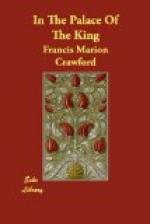“I only heard loud cries,” sobbed Inez. “I came to you—as quickly as I could—I was afraid.”
“We shall never see our father again—unless we see him on the morning when he is to die.”
“Dolores! They will not kill him, too?” In sudden and greater fear than before, Inez ceased sobbing.
“He will die on the scaffold,” answered Dolores, in the same clear tone, as if she were speaking in a dream, or of things that did not come near her. “There is no pardon possible. He will die to-morrow or the next day.”
The present truth stood out in all its frightful distinctness. Whoever had done the murder—since Mendoza had confessed it, he would be made to die for it,—of that she was sure. She could not have guessed what had really happened; and though the evidence of the sounds she had heard through the door would have gone to show that Philip had done the deed himself, yet there had been no doubt about Mendoza’s words, spoken to the King alone over Don John’s dead body, and repeated before the great assembly in the ball-room. If she guessed at an explanation, it was that her father, entering the bedchamber during the quarrel, and supposing from what he saw that Don John was about to attack the King, had drawn and killed the Prince without hesitation. The only thing quite clear was that Mendoza was to suffer, and seemed strangely determined to suffer, for what he had or had not done. The dark shadow of the scaffold rose before Dolores’ eyes.
It had seemed impossible that she could be made to bear more than she had borne that night, when she had fallen upon Don John’s body to weep her heart out for her dead love. But she saw that there was more to bear, and dimly she guessed that there might be something for her to do. There was Inez first, and she must be cared for and placed in safety, for she was beside herself with grief. It was only on that afternoon by the window that Dolores had guessed the blind girl’s secret, which Inez herself hardly suspected even now, though she was half mad with grief and utterly broken-hearted.
Dolores felt almost helpless, but she understood that she and her sister were henceforth to be more really alone in what remained of life than if they had been orphans from their earliest childhood. The vision of the convent, that had been unbearable but an hour since, held all her hope of peace and safety now, unless her father could be saved from his fate by some miracle of heaven. But that was impossible. He had given himself up as if he were determined to die. He had been out of his mind, beside himself, stark mad, in his fear that Don John might bring harm upon his daughter. That was why he had killed him—there could be no other reason, unless he had guessed that she was in the locked room, and had judged her then and at once, and forever. The thought had not crossed her mind till then, and it was a new torture now, so that she shrank under it as under a bodily blow; and her grasp tightened violently upon her sister’s arm, rousing the half-fainting girl again to the full consciousness of pain.




